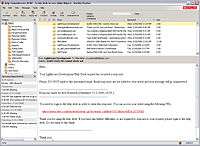Scalix
Scalix is an e-mail and groupware server that runs on Linux, licensed under the Scalix Public License (SPL).[2]
 Scalix Web Access | |
| Developer(s) | Scalix Inc. |
|---|---|
| Stable release | 12.7
/ February 23, 2018[1] |
| Operating system | Linux |
| Platform | x86-64 (64-bit) |
| Type | Groupware |
| License | Scalix Public License[2] |
| Website | www |
Scalix provides e-mail, group calendaring and other collaborative software, which are standard in groupware. It can be accessed from many different clients, most notably Microsoft Outlook, Novell Evolution (formerly Ximian) and Scalix Web Access, an AJAX-based web email and calendaring client that combines the functionality of desktop email with the ease-of-use of a browser.
Background
Scalix was released by Scalix Corporation, based in California, with offices in New York City, Germany, the United Kingdom, Malaysia, Poland, Brazil and Japan, and contract operations in India, Russia and the United Kingdom. The code is based on the earlier HP OpenMail product, which was licensed from Hewlett-Packard.
Scalix Corporation was founded by Julie Hanna in 2002, during her tenure as an Entrepreneur In Residence (EIR) at Mayfield Fund. She served as the company's first CEO. The company was funded by venture firms New Enterprise Associates (NEA), Mohr Davidow Ventures (MDV) and Mayfield Fund.
In July 2007, the company was purchased by Xandros[3][4] and in July 2011 sold to Sebring Software Inc,[5][6] a collaborative integration software company offering on-premises and cloud solutions.
On November 11, 2013, a press release[7] announced a management buy-out and the concurrent release of version 12.0.
Products
Scalix includes and provides the following components as part of its offerings:
- Scalix email and calendar server, a full-featured messaging and collaboration server based on Linux and open source
- ScalixConnect for Outlook, robust third-party native and transparent Outlook support
- Scalix Web Access, an AJAX-based cross-browser, cross-platform email and calendaring client that combines desktop email functionality with the convenience of a browser
- Scalix ActiveSync, push email, wireless calendar and contact synchronization using the ActiveSync protocol
- ScalixConnect for Blackberry, allows full integration with BlackBerry Enterprise Server
- ScalixConnect for Evolution, full-function email and calendaring client support for Linux desktop users
- Scalix Wireless Solution, advanced wireless email/PIM support for Blackberries, Treos and Smartphones
- Scalix Administration Console, AJAX-based web client for administering the Scalix server and email users
- ScalixReady for Open Source and Commercial messaging ecosystem components, which certifies that third party software works with Scalix
- MS Ecosystem Interoperability for seamless co-existence with MS Exchange and Active Directory
- Individual email level backup / restore when using SepSesam
Scalix comes in several different editions: Enterprise, Small Business, Hosted, Community and Raw, the latter two being free software.
Scalix Inc. claims there are 250 Scalix-capable partners and affiliates, worldwide.[8]
Software license
The Scalix Public License is based on the Mozilla Public License (MPL); the modifications have not been approved by the Open Source Initiative. The SPL adds an appendix (exhibit b) to the MPL requiring that any products derived from Scalix source code display a "Scalix" logo that links back to the Scalix website, and a copyright notice "in the same form as the latest version of the Covered Code distributed by Scalix at the time of distribution of such copy"; see the license for details.[2]
Status
Scalix had a difficult road getting the latest version out, with a maintenance update, announced for Q4/2011, and a major release, announced for Q1/2012,[9] not being released. After an over-three-year-long wait, the next major release of Scalix, version 12[7] was released on November 11, 2013, with support included for Outlook 2010 and 2013.[10]
See also
External links
References
- "Scalix 12.7 Release". Retrieved 2019-10-08.
- "Scalix: Community: Open Source Licensing". Archived from the original on 2007-02-05. Retrieved 2007-03-24.
- https://www.theregister.co.uk/2008/11/04/open_xchange_funding/
- "Scalix Bought by Xandros". Retrieved 2007-07-18.
- "Securities and Exchange Commission (SEC) Announcement". Retrieved 2011-07-19.
- "Sebring Software, Inc. Announced the Acquisition of Award Winning Scalix Email and Calendaring Platform from Xandros, Inc". BusinessWire. 12 July 2011. Retrieved 2013-01-03.
- "Scalix Upgrade of Enterprise Groupware follows Management Buyout". Retrieved 2013-11-11.
- Scalix Partners
- Mirko Lindner (28 June 2011). "Neue Version von Scalix erst im kommenden Jahr". Retrieved 2013-01-03.
- "Technology: New in Scalix 12.0". Retrieved 2013-11-11.